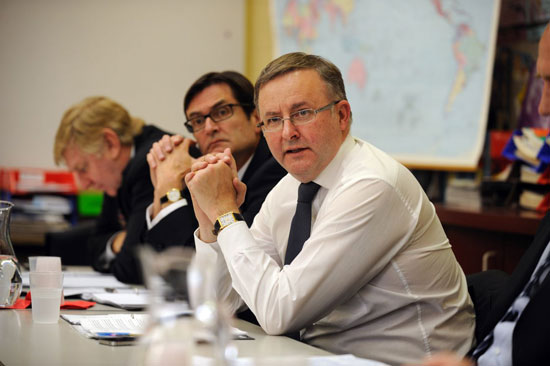Telco industry wants Albanese to focus on competition, NBN policy

As Australian Deputy Prime Minister Anthony Albanese was this afternoon sworn in as minister for Broadband, Communications and the Digital Economy, the telecommunications industry has broadly welcomed him to the role, with some advice for what he should be focusing on in the lead-up to the election.

Albanese was sworn into the job by Governor-General Quentin Bryce this afternoon, along with his support MPs — Minister for Regional Communications Sharon Bird, Minister Assisting for the Digital Economy Kate Lundy, and Parliamentary Secretary for Broadband Ed Husic.
The deputy prime minister already held responsibility for transport and infrastructure, and will retain those portfolios. Although he doesn't have any extensive experience in the telecommunications portfolio, Albanese has represented the former minister for communications, Stephen Conroy, in answering questions in the House of Representatives.
Vodafone CEO Bill Morrow said that he looks forward to working with the new ministers.
"The National Broadband Network is one of this country's most important infrastructure projects as Australia builds its digital capacity and maintains its global economic competitiveness," he said in a statement.
"I look forward to working with the new ministers to ensure that all Australians benefit from the digital revolution and a competitive telecommunication industry."
He particularly welcomed Bird to her role, stating that there needs to be a greater policy focus on delivering a competitive telecommunications market for regional Australia.
Optus vice president of corporate and regulatory affairs David Epstein said that Albanese will bring a strong background in national infrastructure issues to the NBN portfolio. Epstein said he welcomes Husic's appointment given his prior role as the national president of the Communications, Electrical and Plumbing Union of Australia, and as he was also the divisional secretary of the Australian Worker Union's communications division.
"Mr Husic has a strong knowledge of the telecommunications industry from his time as a union official, and we have enjoyed a good relationship with him as the convenor of the ALP digital economy group," Epstein said.
iiNet CEO Michael Malone told ZDNet that he would like to see Albanese reassess the possibility of NBN Co opening up backhaul to access seekers, and re-evaluate the capacity charge for services on the NBN.
With key decision makers Conroy and former Prime Minister Julia Gillard now gone, Malone said it is now a chance for the government to reconsider a fibre-to-the-basement policy for multi-dwelling units (MDUs) that Cabinet previously rejected.
"Now there's a chance for new policy, no one is bound by what was there on the table, so perhaps revisiting putting fibre to the basement for MDUs, which I think would be an obvious thing to do and it would mean you have 15 to 20 percent of the population to be getting onto the NBN next year."
He disagreed that such a policy would create a two-tiered system for fixed-line broadband in Australia.
"VDSL2 will still deliver up to 100Mbps, and you're seeing bonded DSL and vectoring deliver speeds much higher than that," he said. "With very short runs, you can get extremely close to the customer."
Telstra CEO David Thodey welcomed Albanese to the role.
"We welcome Mr Albanese, who has been carrying the Comms portfolio in the House of Reps for a number of years, and we look forward to working with him," Thodey said in a statement.
Telecommunications industry analyst Paul Budde said that Albanese taking on the portfolio as well as being deputy prime minister shows how seriously the government takes the NBN.
"Anthony Albanese is in many aspects the right person to take on the NBN. While the debate has sometimes been rather different, the NBN has all to do with national infrastructure and very little with telecommunications, and while the deputy PM might not be as knowledgeable about telecoms, he most certainly is knowledgeable in relation to infrastructure," he said.
Budde said Albanese is a seasoned politician who will be well positioned to respond to the "political rhetoric" from Shadow Communications Minister Malcolm Turnbull.
Turnbull said today that the NBN is "a project in crisis", and issued a set of questions to Albanese that he believes needs to be answered, including whether NBN Co's chair Siobhan McKenna is now actively looking to replace CEO Mike Quigley.
Shadow Regional Communications Minister Luke Hartsuyker was also critical of Labor for only now appointing the regional communications ministry role close to three years after the Coalition established the portfolio.
"Communications services in regional Australia need the dedicated attention of a competent and experienced minister," he said in a statement.
"The appointment of a first-time minister to the Regional Communications portfolio leads me to believe this appointment is more about electioneering and less about tackling the big communications issues in regional Australia."